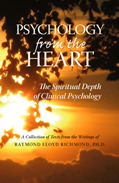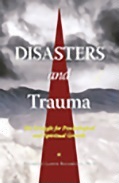|
RAYMOND LLOYD RICHMOND,
PH.D. holds
his doctorate in clinical psychology and is licensed as a psychologist
(PSY 13274) in the state of California.
Previous to his doctoral degree, he earned an M.A. in religious studies,
an M.S.E. in counseling, and an M.S. in clinical psychology.
During the course of his education he received training in Lacanian
psychoanalysis, psychodynamic psychotherapy, hypnosis, and cognitive-behavioral
therapy. He completed a Post-doctoral Fellowship in Health Psychology. His clinical
experience encompasses crisis intervention; treatment for childhood
emotional, physical, and sexual abuse; trauma and PTSD evaluation and treatment;
and treatment of psychotic, mood, and anxiety disorders.
|
Psychoanalytic Psychotherapy
Counterterrorism |
For the protection of my security on the Internet,
these are the only personal details that I will provide.
B.A. English Literature
M.A.
Religious Studies
M.S.E.
Education/Counseling
M.S.
Clinical Psychology
Ph.D.
Clinical Psychology
Postdoctoral Fellowship in Health
Psychology
|
|
Author(s)
and title |
1999 |
Richmond, R. L. & Carmody, T.
P. (1999). Dropout from treatment for chronic low-back pain. Professional
Psychology: Research and Practice, 30(1), 51-55. |
 |
|
1997 |
Richmond, R. L. (1997). The fourth
pleasing idea. American Psychologist, 52, 1244. |
 |
|
1992 |
Richmond, R. (1992). Discriminating
variables among psychotherapy dropouts from a psychology training clinic.
Professional Psychology: Research and Practice, 23(2), 123-130. |
 |
|
|
Author and
title |
1986 |
Richmond, R. (1986). Biorhythms.
Soft Sector, 2, 28-33. |
 |
|
|
 |
 |
 |
|
FOR THE SAKE
OF TRUTH this website about the practice of Clinical Psychology does
not accept any advertising.
Therefore, if my work has been
informative and helpful to you, please send a donation
in appreciation, even if it’s only a few dollars, to help offset my costs
in making this website available to everyone without advertising.
Raymond Lloyd Richmond,
Ph.D.
San Francisco
Communications
|
Throughout this
website, my goal is to help you realize that although life can be
painful, unfair, and brutal, it doesn’t have to be misery.
The practice of good clinical psychology is not about having your pain
“taken away” but to be helped to take up the cup of your
destiny with courage and honesty. |


Anger and
Forgiveness
(4th edition)
Shows how to turn the emotional wounds
of daily life into psychological growth.
More
information |
|

Psychology from
the Heart
Collected texts about the spiritual
depth of clinical psychology.
More
information |
|

Disasters and
Trauma 3E
The Struggle for Psychological and Spiritual
Growth.
More
information |
|
|
|
 |